The world’s most dangerous Pride demonstrations
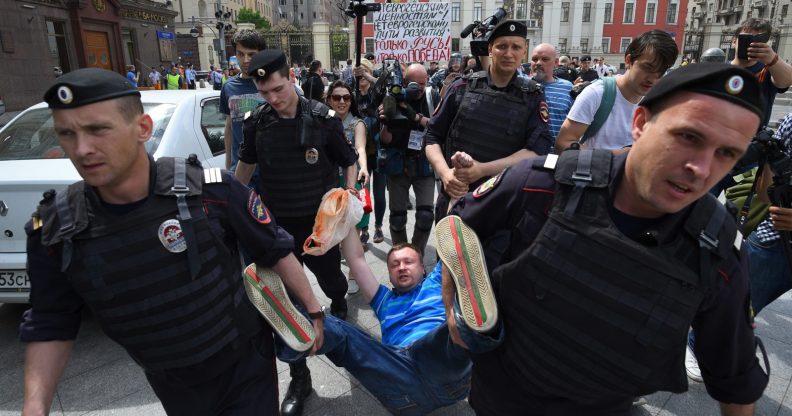
Russian riot policemen detain gay and LGBT rights activist Nikolai Alexeyev (C) during an unauthorized gay rights activists rally in central Moscow on May 30, 2015. Moscow city authorities turned down demands for a gay rights rally. AFP PHOTO/DMITRY SEREBRYAKOV (Photo credit should read DMITRY SEREBRYAKOV/AFP/Getty Images)
PinkNews takes a look at some of the most dangerous Pride parades, demonstrations and gay rallies that have happened in recent years.
Moscow, Russia
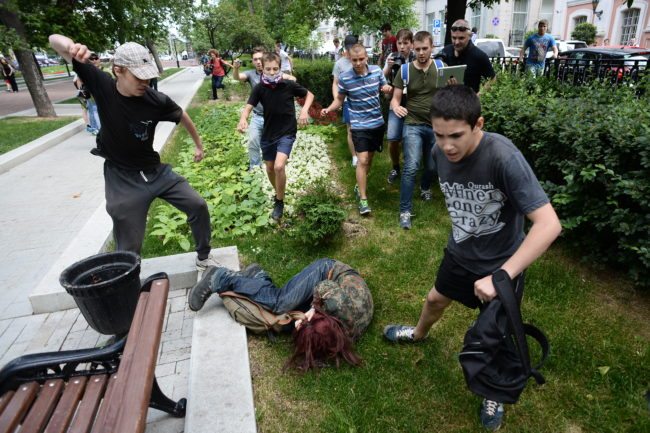
Day of Kisses Demonstration in Moscow, Russia (Getty)
The city of Moscow has denied over a 100 requests to host Pride events.
Rallies and demonstrations in Russia’s big cities, such as the Day of the Kisses (pictured), often turn violent. The rallies are seen as unofficial protests against Russia’s discriminatory laws against LGBT people.
Russia introduced legislation in 2013 to outlaw the “propaganda of non-traditional sexual relationships” towards minors, which has had a chilling effect on LGBT rights activists and led to an increase in violence towards LGBT people.
Istanbul, Turkey
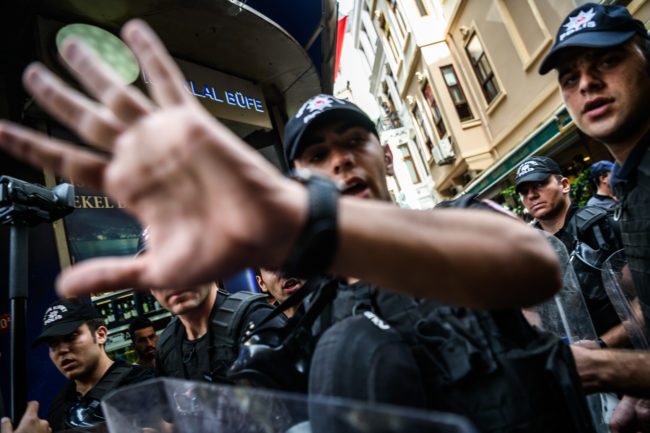
Istanbul, Turkey. 2016 (OZAN KOSE/AFP/Getty Images)
Turkey’s LGBT rallies are known to be one of the most dangerous for parade-goers. Hundreds of anti-riot police officers have been known to surround demonstrators, fire rubber bullets and use tear gas and water cannons to break up the Pride marchers.
Demonstrations in Taksim square have been banned since 2013.
Despite calls from human rights charities, police brutally attacked the Pride event in 2017.
Though homosexuality is officially decriminalised, LGBT couples are not legally recognised by the state of Turkey.
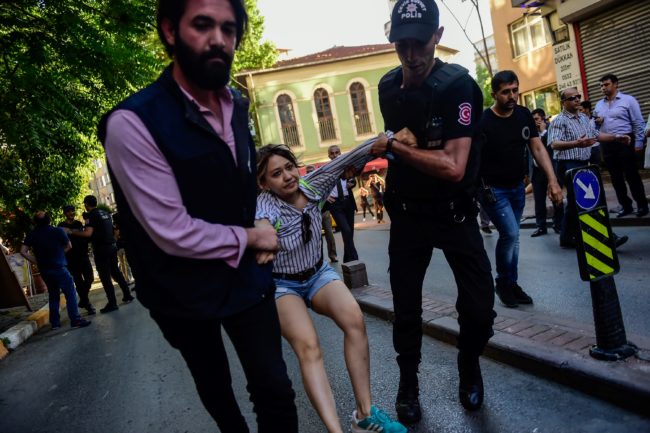
Istanbul Pride, 2017. (YASIN AKGUL/AFP/Getty Images)
Jerusalem, Israel
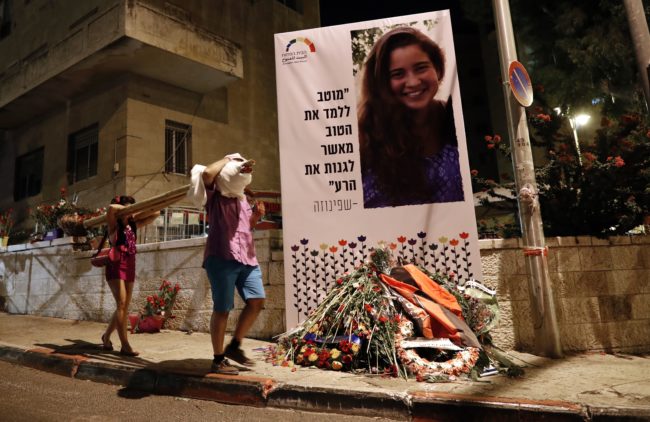
A portrait of Shira Banki, 16, who was killed at Jerusalem pride. (THOMAS COEX/AFP/Getty Images)
Jerusalem Pride has seen a number of violent incidents over the years.
In 2015, six parade goers were stabbed and wounded and sixteen-year-old Shira Banki was killed.
The attacker, an ultra-Orthodox Jewish man, had been known to police and made several public threats to the parade – leading to questions about why he was not stopped in advance.
2017 also saw a string of arrests amid a feared attack.
Parts of Israel are liberal on LGBT rights, but homophobia is rife in parts of the country and among ultra-orthodox communities.
St. Petersburg, Russia
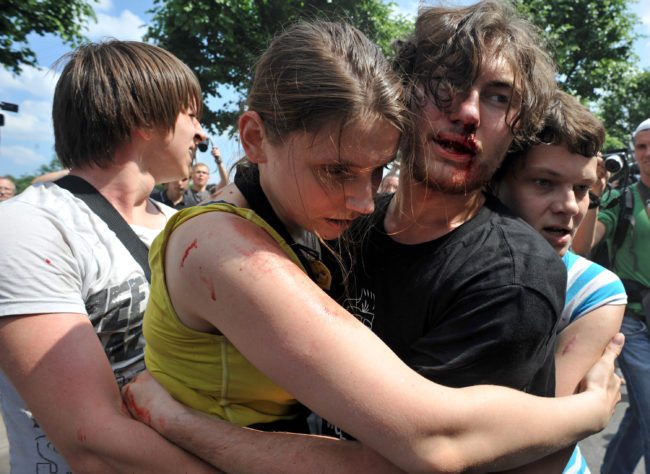
St. Petersburg LGBT demonstration, 2013 (OLGA MALTSEVA/AFP/Getty Images)
Anti-gay violence occurs regularly in Russia’s second city, St. Petersburg.
Gay rights activists, pictured, embrace each other after clashes with anti-gay demonstrators during a pride event in St. Petersburg on June, 2013. Hundreds of arrests were made.
Nicosia, Cyprus
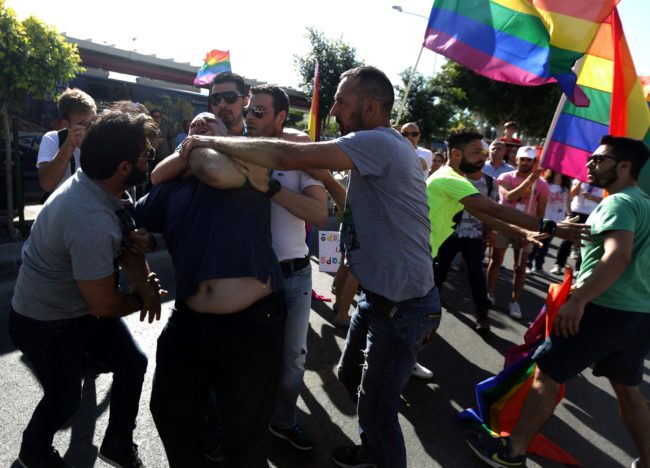
Nicosia, Cyprus. 2014 (PATRICK BAZ/AFP/Getty Images)
Cyprus’ first-ever gay pride parade took place in Nicosia in 2014, 16 years after homosexuality was finally decriminalised in the country. It had been the last place in Europe to maintain laws banning gay sex.
Demonstrations in Nicosia still often result in violence.
A smoke bomb was thrown at Pride marchers in 2014, as a group of Orthodox Christian protesters tussled with police.
Events in more recent years have been peaceful.
Kyiv, Ukraine
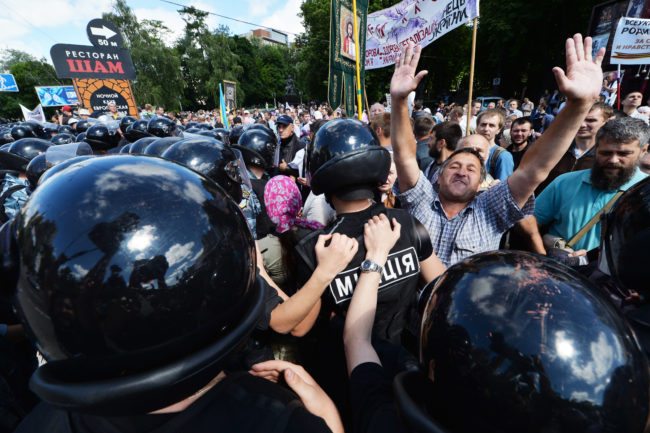
Kyiv, Ukraine. 2013 (SERGEI SUPINSKY/AFP/Getty Images)
Kyiv Pride has been the scene of several violent clashes between Pride marchers, far-right groups and police.
Ukraine’s first pride took place in Kyiv in 2013, marking the first gay pride event in the ex-Soviet country.
Police are pictured in 2013, attempting to displace hundreds of Kyiv’s Orthodox Christians protesting Pride.
Around a hundred gay rights activists marched, despite fears of violence and a court ban.
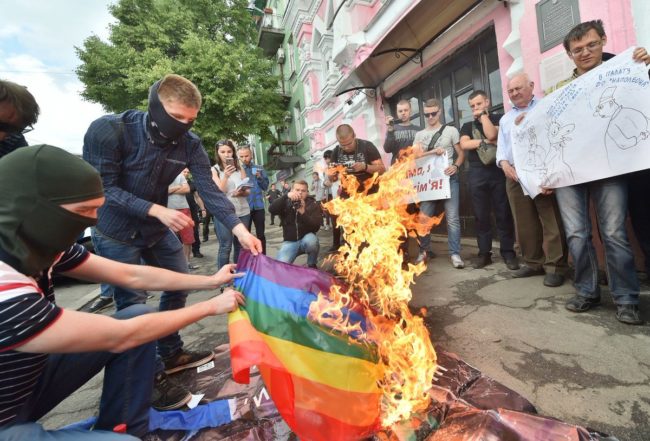
Far-right activists burn the rainbow LGBT flag during the official opening of Kyiv Pride 2017. (Photo by SERGEI SUPINSKY/AFP/Getty Images)
There is no legal protections for same-sex couples in Ukraine. A 2010 Pew Research Center study found that just 28% of Ukrainians were polled as believing that LGBT individuals should live freely and however they like.
Peaceful Prides have taken place in more recent years despite ongoing threats.
New Dehli, India
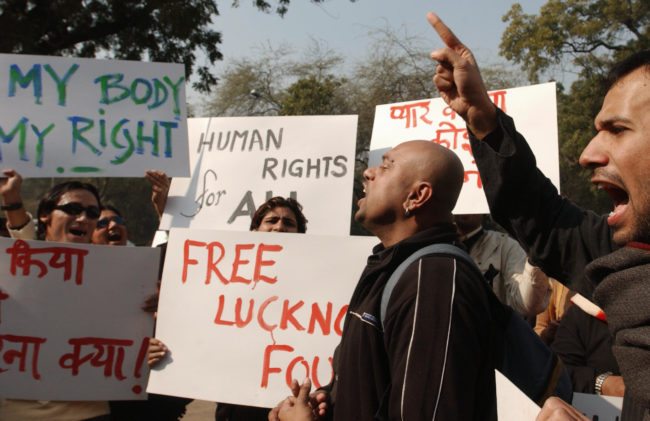
New Dehli, India. 2006. (MANPREET ROMANA/AFP/Getty Images)
Pictured are Indian gay rights activists protesting in New Delhi in 2006 against homophobic discrimination by the police force. Four homosexual men were caught allegedly having sex in public place in Lucknow, Uttar Pradesh.
Under Section 377 of Indian penal code, a hangover from British Colonial rule, homosexuality is punishable by maximum of 12 years imprisonment. Transgender people are recognised legally as ‘hijra’, or third gender.
Entebbe, Uganda
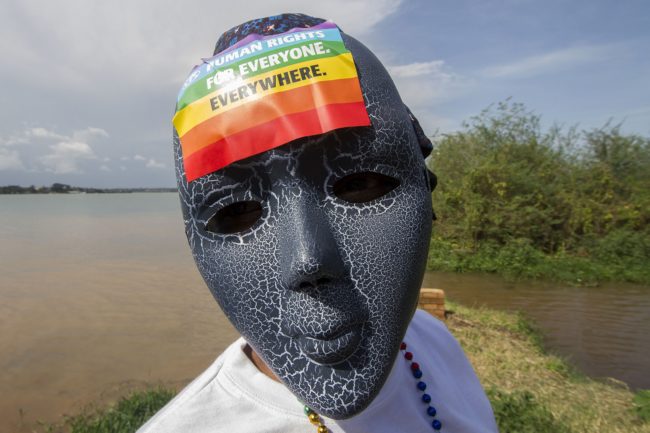
Entebbe, Uganda. 2015 (ISAAC KASAMANI/AFP/Getty Images)
The country’s first Pride took place in 2012 in the capital, Kampala.
Since then, it has been cancelled multiple times due to the threat of violence, and the murder of its LGBT civil rights leader, David Kato.
This year’s Pride was officially cancelled, but the Ugandan LGBT community took a stand and held a secret parade in a second location.
The party was described as “full of joy and defiance”.
It has been three years since the overturning of a strict anti-gay law, but homosexuality remains illegal in Uganda, punishable by a prison sentence.

